Hitachi's Wylfa nuclear project pause 'tremendous blow'
- Published
The Wylfa news is a 'shame' for Coleg Menai engineers
Pausing work on the £13bn Wylfa Newydd nuclear power project will deliver a "tremendous blow" to the Welsh economy, business leaders have said.
Japanese tech giant Hitachi said it was suspending construction of the new plant in north Wales as the project's cost continues to spiral.
Horizon Nuclear, which is owned by Hitachi, said work could restart when funding solutions were agreed.
About 9,000 workers had been expected to build the Anglesey plant.
Leighton Jenkins, assistant director of the Confederation of British Industry in Wales, said the importance of the decision "cannot be over emphasised".
"This is not just important for the region, not just for Wales but for the whole of the UK's energy structure," he said.
"We are becoming a nation of artist's impressions... We need to have a strategic review as to why we struggle to deliver major infrastructure projects in Wales."
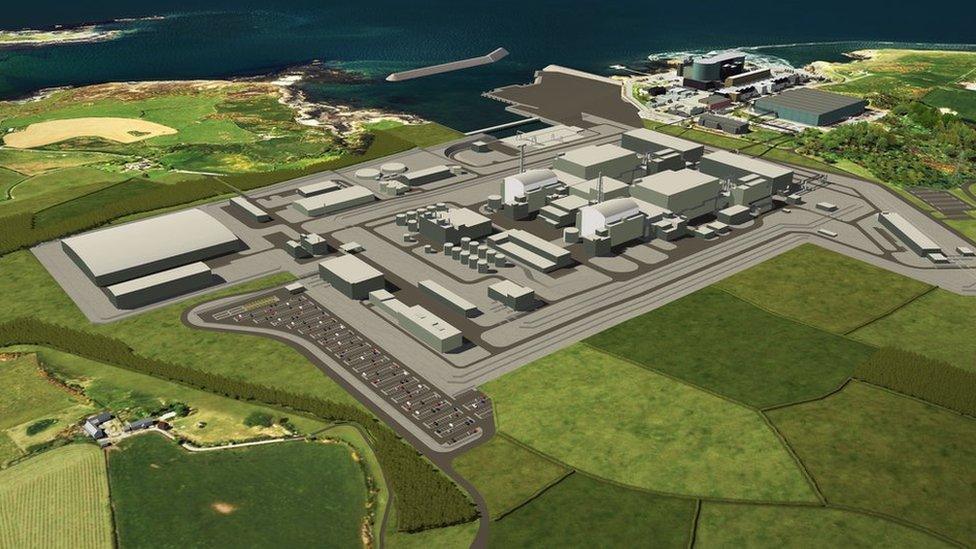
Wylfa Newydd would have a 60-year operational life
Duncan Hawthorne, Horizon's chief executive, said: "We have made very strong progress on all aspects of the project's development, including the UK design of our tried and tested reactor, supply chain development and especially the building of a very capable organisation of talented and committed people.
"We have been in close discussions with the UK government, in cooperation with the government of Japan, on the financing and associated commercial arrangements for our project for some years now.
"I am very sorry to say that despite the best efforts of everyone involved we've not been able to reach an agreement to the satisfaction of all concerned.
"As a result we will be suspending the development of the Wylfa Newydd project, as well as work related to Oldbury, until a solution can be found."
The two projects would require a total investment of £20bn.
National Grid has also confirmed it is suspending work on as 20-mile (32km) network of overhead pylons on Anglesey, which would connect with the new power station.
"We will continue to keep in close contact with Horizon to understand their plans," said a spokesman. "We will only develop our proposals if they are needed."
Richard Foxall, Horizon's strategic communications director, said it was going to be a "very tough time" for the 150 people, including contractors, already working on the project.
"There isn't going to be very many of us - if any of us - left here. It's going to be a huge hit for us."
Horizon said it was looking to minimising the impact and was starting a consultation with staff, who have shown "extraordinary talent, resilience and determination".
Energy is not currently devolved to the Welsh Government but Economy Minister Ken Skates said he was "deeply concerned" and that an emergency economic ambitions board meeting would take place on Monday.
He said the UK Government "needs to step up to the plate" and he wanted urgent assurances about the project and the wider implications for the regional economy.
The plant aimed to have a generating capacity of 2900MW of electricity by the mid 2020s - enough power for about five million homes - and a 60-year operational life.
The island's Plaid Cymru Welsh assembly member Rhun ap Iorwerth said it was a very worrying time for the staff and apprentices already employed on the project.
"But I'm thinking also about those who've pinned their hopes on future employment there," he said.
"Now we have to look at ways of moving forward. UK Government has to show if it's serious about backing Wylfa."
Anglesey Council is to hold a meeting in the next few days, with council leader Llinos Medi saying they would press the case with the UK government for the delay to be overcome.
Gwynedd council leader Dyfrig Siencyn, vice chairman of the North Wales Economic Ambition Board, said it was worth "billions" to the local economy.
"It's quite difficult to imagine the sums we're talking about so the impacts are extremely severe," he added.
Coleg Menai has 700 engineering students, many hoping to take advantage of opportunities from Wylfa and its supply chain.
It has also welcomed hundreds of local school children, encouraged to look at future jobs in engineering and the nuclear industry.
The college confirmed its 30 Horizon apprentices would be funded to finish their three year courses and still be offered work experience.
"That is at least some consolation to us today," said Dafydd Evans, chief executive of the Grŵp Llandrillo Menai college network.
"I don't want young people to lose faith - we've got to keep some element of optimism while we work really hard to get this scheme on track."
Analysis from Steffan Messenger, BBC Wales environment correspondent
Nuclear currently accounts for more than a fifth of electricity generated in the UK.
It has been seen as important because it is predictable low-carbon power, constantly feeding the national grid unlike the fluctuating output of wind and solar.
The plan had been for several new plants to come on stream by the mid 2030s.
But so far only one proposal - Hinkley Point C - has made it off the drawing board - with experts warning of a looming energy gap.
If traditional, big plants are too costly, proponents of small modular reactors - such as the one proposed for Trawsfynydd in Gwynedd - could see this as an opportunity.
Others will call for significant investment in renewables.

Edward Jones, a lecturer in economics at Bangor University who advises the North Wales Growth Bid, said: "A pause is the best case scenario."
He added people in north Wales had already been investing in developing new skills for the project, along with investment by Hitachi themselves and other stakeholders.
Unite union called it a "hammer blow" and said the UK government had "failed miserably to put its full weight behind this bid".
UK Business Secretary Greg Clark told MPs that ministers were willing to provide a "significant and generous package" of support to Hitachi to continue work at Wylfa.
He revealed that the UK government was willing to take a one third equity stake in the project and was ready to provide all of the required debt financing to see the project completed.
Prime Minister Theresa May on Wednesday said she had raised Wylfa at her recent meeting with her Japanese counterpart and she wanted to see nuclear "as part of our energy mix in the future."
Welsh Secretary Alun Cairns told BBC Good Evening Wales he was still "very positive" the project would go ahead and that a partner would be found.
Conservative environment spokesman Andrew RT Davies AM added: "Whilst disappointing, this news isn't the end of the road," he said.
But the anti-nuclear group Pawb welcomed the announcement and said its warnings over a long period about the project's costs had been ignored.
"It is time for politicians and officials from the UK government, the Welsh Government and Anglesey to admit that they were wrong," it said in a statement. "Wales is rich in natural resources which can be used to create a vibrant and sustainable energy future, and above all else create more jobs in less time than Wylfa would have done."
- Published17 January 2019
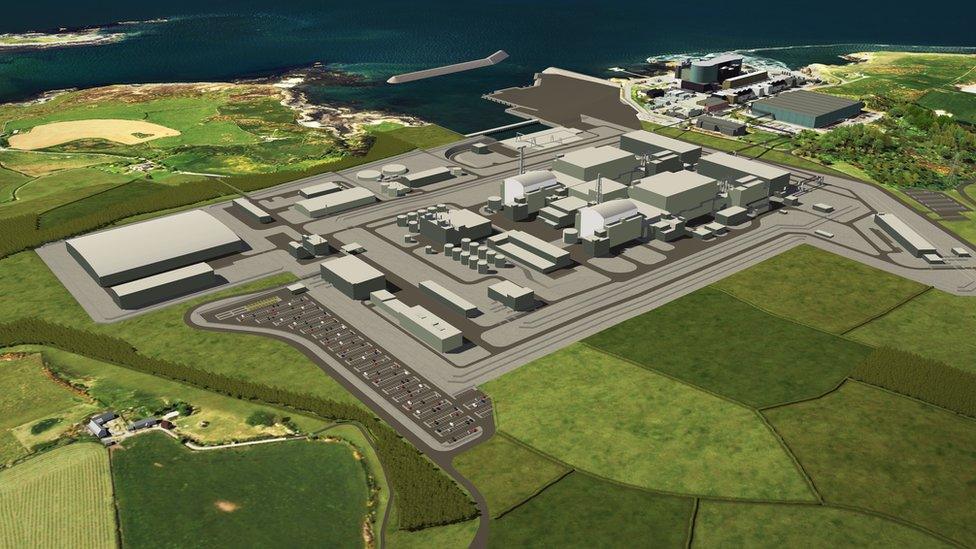
- Published17 January 2019
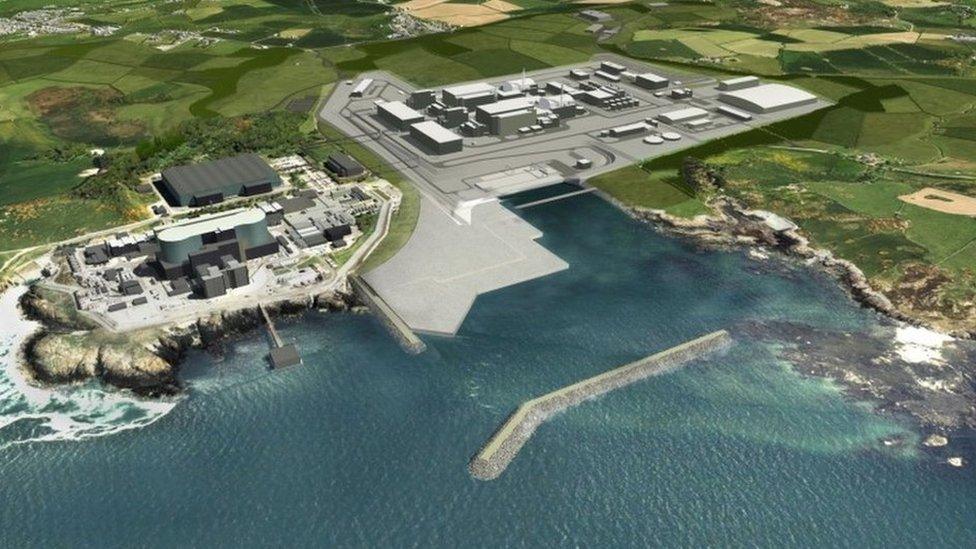
- Published15 January 2019
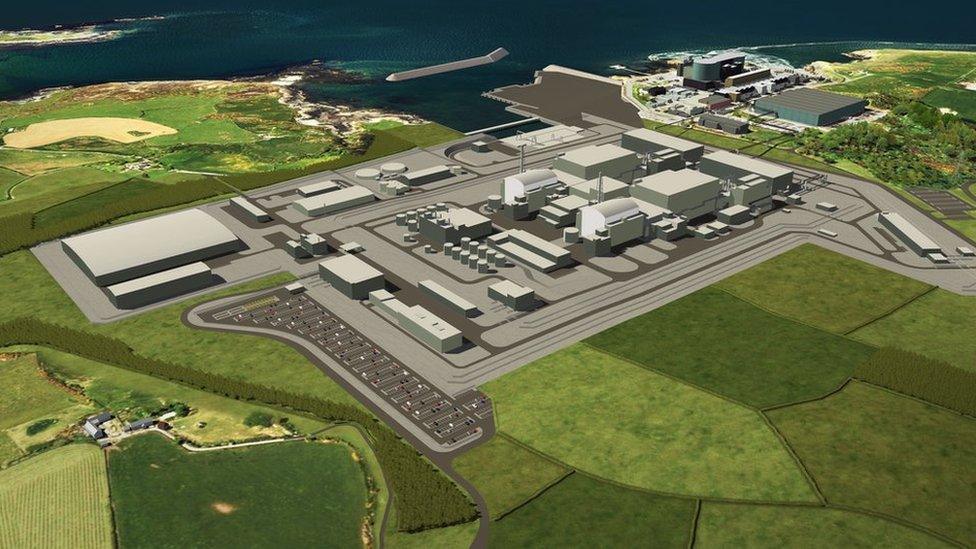
- Published11 January 2019
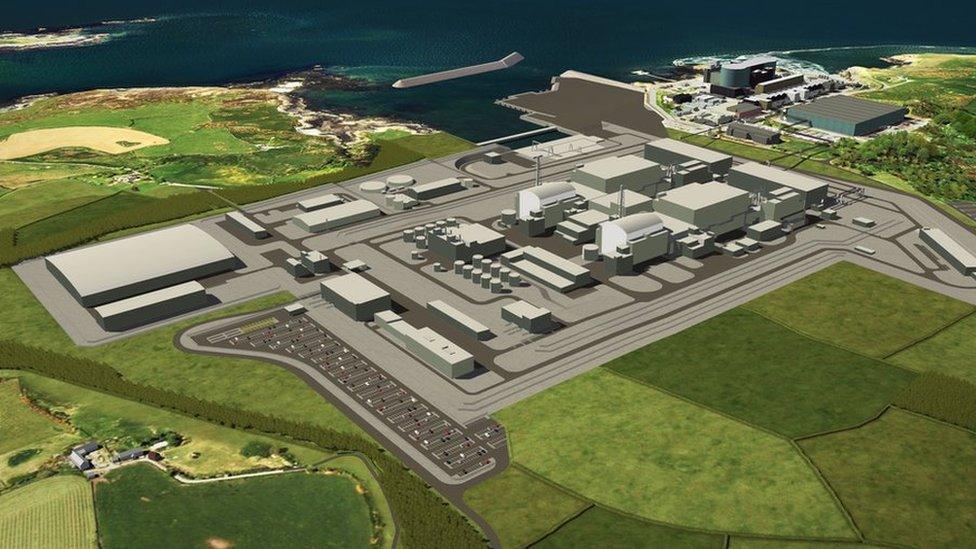
- Published17 January 2019
